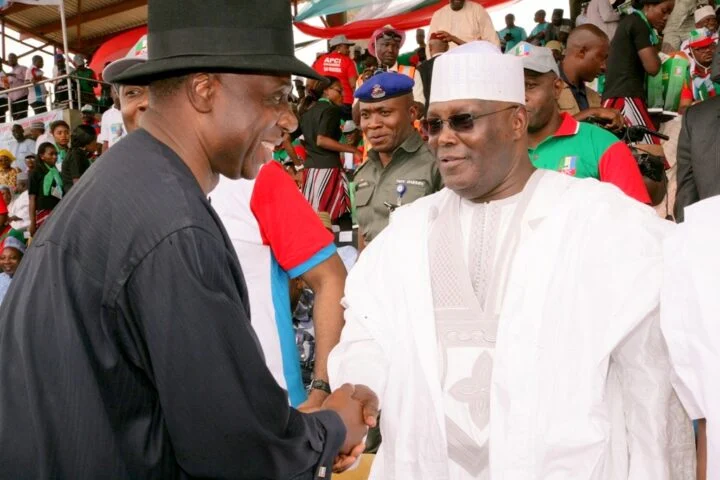966
By Myke Agunwa
The mega coalition team led by former Vice President Atiku Abubakar has reiterated its resolve to unseat President Bola Tinubu and end the regime of the All Progressives Congress (APC) in 2027, stressing that the present regime has used poverty as a tool to perpetuate itself in power.
The team reaffirmed their determination during a public lecture in Abuja on Saturday with the theme “Weaponisation of poverty as a means of underdevelopment: A case study of Nigeria,” to commemorate Amaechi’s 60th birthday.
The leaders of the coalition were in agreement that the present administration has plunged more Nigerians into poverty and vowed to mobilize Nigerians to end the tenure of Tinubu and lamented that Nigerians keep recycling incompetent leaders at each election cycle.
They added that Nigerians have the capacity to remove any government and change the situation if the people are united.
Recall that a group of politicians, irrespective of party lines, are shopping for a credible platform to stop the re-election of President Bola Tinubu under a mega coalition.
In his goodwill message, Atiku lamented that the present administration has turned poverty into a weapon to remain in power.
“This particular government is weaponising poverty. That is why we are in this alliance – to make sure we don’t allow them to continue to weaponise poverty.”
Adding his voice, former Kaduna State counterpart Nasir El-Rufai addressed Amaechi as a “co-conspirator”, recounting how they both worked together to achieve a set political agenda.
El-Rufai expressed disappointment that Nigerians keep repeating the same mistake of electing the worst among us into positions of authority.
He said, “We are in this coalition to put Nigeria back on the right track.”
Archbishop emeritus of the Catholic Archdiocese of Abuja, Cardinal John Onaiyekan, admonished politicians to see their vocation as a service to God.
He explained that politics should not be an avenue for the accumulation of personal wealth but to render service, which ultimately means uplifting the quality of lives of citizens to the glory of God.
Similarly, The Emir of Kano, Sanusi Lamido Sanusi, noted that he came face to face with poverty when he ascended the throne as Emir.
The ex-Central Bank of Nigeria governor said, “Many of the elite in Nigeria do not know what poverty is. As an economist and former CBN governor, I see the numbers. I did not know poverty until I became Emir.
“You go to the village and see the water they drink; the houses they live in—two-block classrooms without roofs.
“Do we actually love the people, or do we just love ruling over them? What are our priorities?
“We make overpasses and underpasses for ourselves in the cities, while those in the rural areas cannot reach hospitals. We are in crisis; how do we get out? should be our focus.”
Sanusi charged those saddled with the responsibility of leadership to inculcate the virtues of empathy with those they’ve been given a responsibility to lead.
A former Executive Secretary of the National Health Insurance Scheme, Prof. Usman Yusuf, on his part, explained that most of the cases being handled in hospitals today were not medical but poverty-induced social problems.
Yusuf blamed corruption and bad governance for the multidimensional poverty in Nigeria. He said unless citizens live up to their responsibilities and vote for what is right.
Earlier, the guest lecturer, Dr. Chidi Amuta, noted that unlike in other climes, in Africa, democracy as a system of governance has remained stunted because post-colonial parliaments were decreed into existence on the backs of poor people.
He said, “The form of political organisation preceded the content of the lives of the people. An unproductive political elite foisted formal democracy on the people who were mostly poor. This is the major reason why democracy has remained stunted in most of Africa.”
Amuta equally noted that the categorisation of poverty in Nigeria as “multidimensional” unsettled our politicians.
In his welcome address, the celebrant, former Governor Rotimi Amaechi, explained that his refusal to support Bola Tinubu in 2023 was rooted in his knowledge that Tinubu didn’t have the capacity for the job.
Amaechi said, “I told Tinubu in Yola, ‘I will not support you; I will not work for you.’ I did not work for him; I did not vote for him. It was the issue of capacity.”
“Some of us who are here are also those who vote on an ethnic or religious basis. Innocent, uneducated people are manipulated to vote based on ethnicity and religion—that’s why we are here.
“When we leave here, we go to plot to go and grab power; no Nigerian leader cares for you.
“You rooted for the Muslim/Muslim ticket, let the Muslim market come out now. For us in opposition, if you want us to remove this man, we can remove this him from power.
“We want to submit to the opposition if the opposition will take us out of this problem.
“They are weaponising poverty by stealing the money they should have used to build hospitals and schools.
“The benefit of the fuel subsidy removal is in their pockets, ” he added.
He said he was ashamed because things have gone so bad that carrying the green Nigerian passport internationally has become a burden.
Dignitaries at the event include former Vice President Atiku Abubakar; former National Chairman of the Peoples Democratic Party (PDP) Uche Secondus; Ex-Chief of Army Staff General Tukur Buratai; former National Chairman of the All Progressives Congress (APC) Chief John Odigie-Oyegun; and ex-governors of Benue, Niger, Cross River, and Bayelsa States: Gabriel Suswam, Babangida Aliyu, Liyel Imoke, and Senator Seriake Dickson respectively, among others



